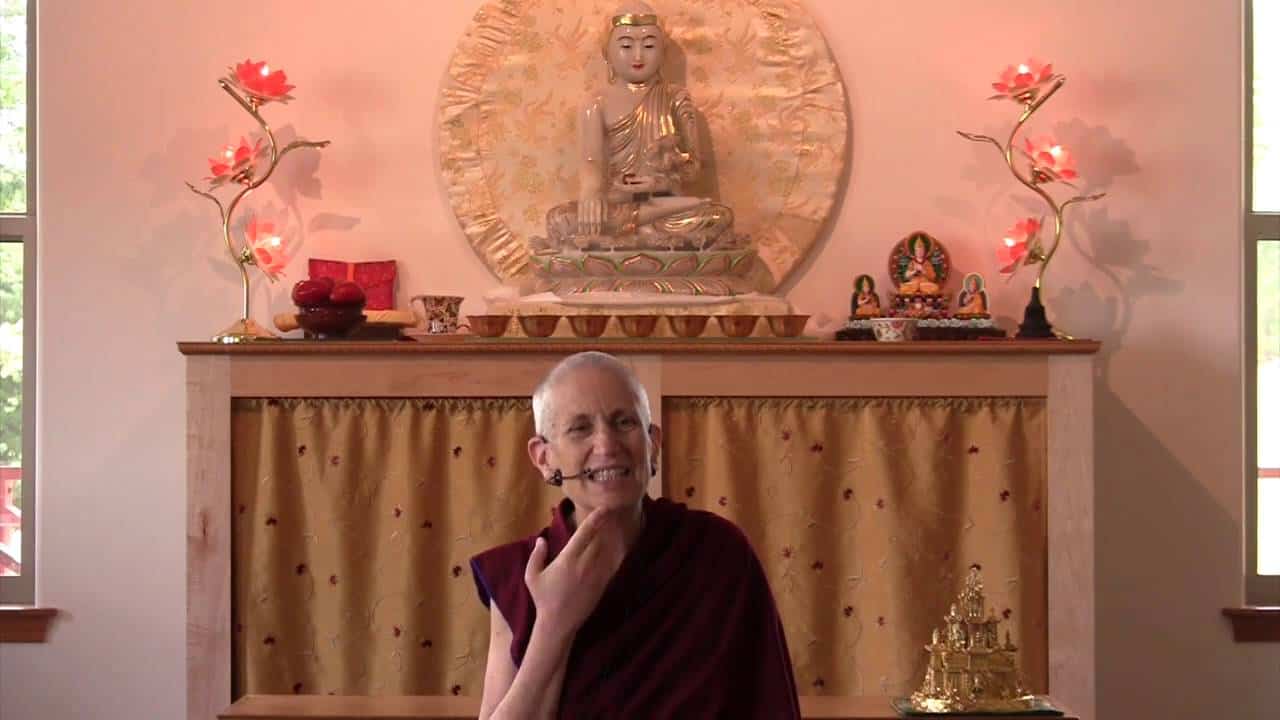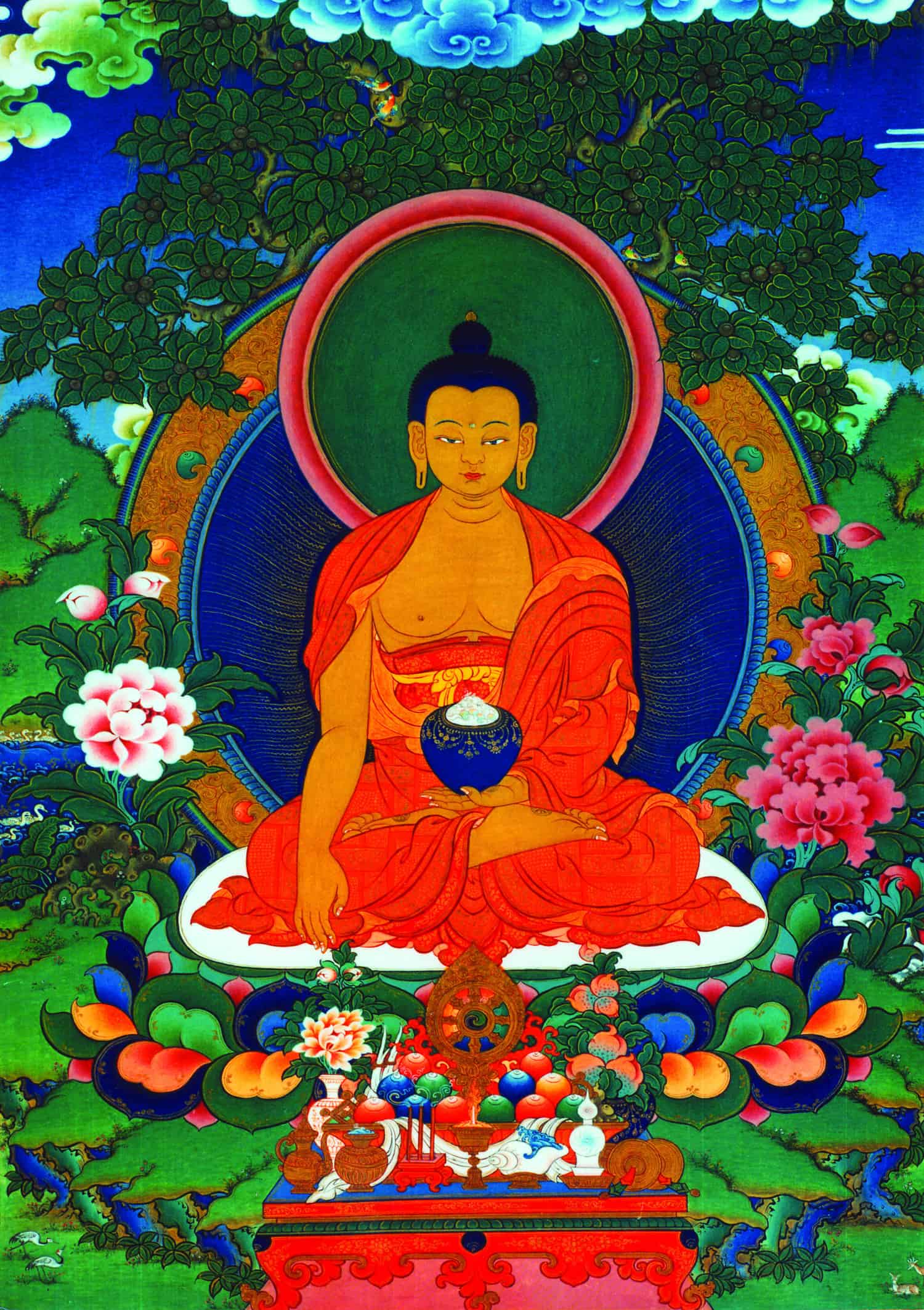Our contribution to peace
Part of a series of teachings on a set of verses from the text Wisdom of the Kadam Masters.
- How self-grasping lies at the root of violence in America
- Why realizing emptiness can be our greatest contribution to peace
Wisdom of the Kadam Masters: Our contribution to peace (download)
We’ve been doing the line,
The best antidote is the recognition that everything is devoid of intrinsic (or inherent) existence.
I wanted today to relate that to what happened in the country yesterday, because yesterday there was another shooting of three police officers who died in Baton Rouge. Some others were also injured, and one fighting for his life, actually. This line from this old Kadampa text applies very much to that because the line—what we were talking about yesterday—is how we cling to a very reified (or concrete) idea of our self, there’s this big “I.” And because of this wrong conception of our self as some concrete entity, then MY happiness becomes most important, MY suffering is most important. We cling to what seems to benefit us, we push away what seems to not benefit us. We decide “benefit” and “not benefit” based on all sorts of crazy notions that have no common sense at all when we really look at them, except the notion of “I think this is what’s happening,” or, “I feel this is what’s right.”
This grasping at the wrong conception of ourselves in this way they say is the root of all suffering. You can really see it in what’s happening in the country right now. The president, after the shooting in Baton Rouge yesterday, was really encouraging people to come together, to be unified, to watch their speech. I was looking at him and it was like: “Again, I have to do this and nobody’s listening.” But he was saying we have to watch our speech, we have to try and understand each other. And Hillary (Clinton) was saying something similar, people were really trying to understand the other side and not make it into an “us” versus “them” thing.
But US versus THEM is what comes out of this very strong, reified concept of who we are. The more we cling to that idea of “I” and “mine” then the more difficult it is to listen to what other people say, and to really hear their feelings, hear their needs, because we’re so absorbed in ourselves because of this self-grasping.
The wise people are saying “calm down, be united, come together, we’re going to get through this, we have to understand each other, we have to listen, we have to speak sincerely and without all sorts of blame and hyperbole, and all this stuff that goes on.” And it’s amazing to hear how some people, when they hear that, because of the way they’re self-grasping works and the attachment that arises to self, they say, “Nobody’s going to tell me what to do. You tell me to listen to others? Well, I want them to listen to me.” And then they go off on a big thing. They’re trying to get people, even the police—I forget if it’s the head of police or the sheriff or whoever, in Cleveland—are asking people please to leave their weapons at home because the republican convention is there in downtown Cleveland. “Don’t bring your weapons here, it makes it difficult for the police.” Not to mention the threat of violence. And immediately some guy comes in with this huge—it was an AR15—huge artillery kind of thing, strapped over his shoulder, because he wanted to make a statement, that this was his right to do this.
This is what happens when we can’t identify our self-grasping and we become attached to our self, attached to our opinions, we create stories about things, and then we just talk about MY rights. This is MY right. But we don’t think about other people’s rights. We don’t think about other people’s feelings, their needs, their concerns. And then we wonder why there’s so much hostility in the world.
I think what the president was asking us to do was quite reasonable, and also something that…. I mean, it involves our spiritual practice, doesn’t it? Becoming more careful about what we say and to whom we say it. Telling ourselves, reminding ourselves, that we really need to listen to other beings, that they have feelings, and we need to pay attention. And for us as Buddhists thinking about karma, and all the karma that we create in this if we get involved in hatred and animosity, and so forth, versus the karma we create if we’re able to stay balanced and have compassion for others.
Right here in this situation we can see the faults of grasping at a false conception of “I”, why it’s so important that we generate the wisdom that sees that no such “I” like that exists, so there’s no person we have to defend to start with. Which is actually quite a relief.
That’s the wisdom side of the path. And then also if we can cultivate the method side of the path, having compassion and consideration and empathy for other living beings. How much that would improve the state of society now, and of course create karma for the future.
Don’t just read the newspaper and throw up your hands and say, “What’s supposed to be done? What can I do about this?” The Buddha already told us. This is how we need to practice in these situations.
We would much rather sit on our meditation cushion and generate compassion for the fly who’s buzzing around the room and annoying us. That kind of compassion, with that level of annoyance, “Yes, I have so much compassion for this fly.” But somebody who disagrees with us? Somebody who shoots unarmed civilians, somebody who shoots police, can we have compassion for all those people? When we’re so tempted to just scream sometimes at the people that we consider inciting all of this, can we step back and say, “Whew, what’s going through their minds, and look at the kind of self-grasping they have, and the karma that they’re creating, and how much suffering they’re creating for themselves right now, and the karma to suffer in the future, as well as adversely influencing others.” Can we have compassion for somebody, for all the people like that? Can we have compassion for the guy who just feels the need to walk right into the middle of Cleveland with his artillery rifle?
But then to realize that we grasp onto ourselves in the same way. We can’t just sit there and point the finger at him, because we grasp on: “Why are you telling me to do this? I don’t want to do this. I want to do that. My idea is the best. Why are you talking to me this way? Don’t you know who I am?” We do the same thing, don’t we? So to see it in others and have compassion. To see it in ourselves and do something about it. We can’t crawl into others’ minds and change them, but we can and must change ourselves. And one person at a time goes a long way. Because you can see, all you need is one person who’s going off the wall and it affects everybody. So our working on ourselves is definitely a contribution to peace in the world. And the Buddha taught us how to do it.
Venerable Thubten Chodron
Venerable Chodron emphasizes the practical application of Buddha’s teachings in our daily lives and is especially skilled at explaining them in ways easily understood and practiced by Westerners. She is well known for her warm, humorous, and lucid teachings. She was ordained as a Buddhist nun in 1977 by Kyabje Ling Rinpoche in Dharamsala, India, and in 1986 she received bhikshuni (full) ordination in Taiwan. Read her full bio.


